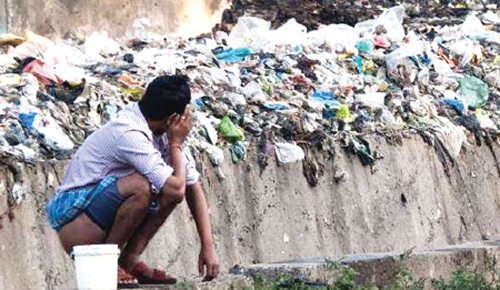Federal Ministry of Environment has reiterated its commitment to implementing policies and programmes aimed at ending open defecation in the country by 2025.
The minister of state for environment, Ishaq Adekunle Saleko stated this at the public hearing of the House of Representatives Committees on Environment, Water Resources, Works, Ecological Fund as well as Emergency and Disaster Preparedness in Abuja, yesterday.
Saleko said the ministry has initiated a programme titled “Clean and Green” in which one of its aims is to eliminate open defecation in Nigeria by 2025 and ensure sustainable total sanitation and implementation of green technology initiatives in Nigeria.
He said the National Environmental Sanitation Policy and its guidelines on sewage and excreta management in the country has been developed.
He also said that the ministry has “established sanitation desks in the 36 States’ Ministries of Environment and FCT to monitor and ensure proper environmental sanitation at the community and household levels by conducting routine sanitary inspections of premises, and sensitizing the public on dangers of open defecation and the importance of having access to toilet in residential and public places.
“Conduct regular sensitisation/advocacy and sanitary inspection of toilets in Federal Government owned institutions and Unity Schools Nationwide.
“Flagged off National Environment Sanitation Intervention/Response to Cholera Outbreak prevention and control in Abuja, FCT with a series of planned activities targeting control of open defecation nationwide which has been implemented in Kogi, Nasarawa and Kano states.”
While declaring the public hearing open, Speaker Abbas Tajudeen said the pressing demand for additional toilets across the nation cannot be ignored.
He said clean and secure sanitation facilities are a fundamental human right that remains inaccessible to millions of citizens.
Abbas said flooding and gully erosion reported from Anambra and Enugu State Communities of Alur-uno and Aguata should be looked into with a view to addressing them.
According to him, these natural disasters not only inflict tragic consequences on the lives of citizens but also have far-reaching impacts on various aspects of the society.
“The havoc wrought by flooding and gully erosion extends beyond the tragic loss of human lives, they significantly impact the economic stability of the affected regions.
“Businesses face disruptions, agricultural lands are destroyed, and vital infrastructure suffers damage, leading to substantial financial losses and hindering economic growth,” he added.





